NYC and Geneva Surpass UNAIDS 90-90-90 HIV Targets
Fast-Track Cities Release New HIV Testing and Treatment Data
Washington, DC, USA (December 2, 2019) – Health officials in New York City, NY, USA, and the Canton of Geneva, Switzerland, announced today that these two cities have surpassed the Joint United Nations Programme on HIV/AIDS (UNAIDS) 90-90-90 targets. The Paris Declaration on Fast-Track Cities calls for attaining and surpassing the targets, which translate into 90% of people living with HIV (PLHIV) knowing their status, 90% of PLHIV who know their status accessing antiretroviral therapy (ART), and 90% of PLHIV on ART achieving viral suppression.
New York City, which became a Fast-Track City in 2016, is the first Fast-Track City in the United States to surpass the 90-90-90 targets by attaining 93-90-92. By attaining 90-96-93, the Canton of Geneva becomes the fifth European municipality to reach this important milestone, joining the cities of Amsterdam, Netherlands; Brighton, UK; London, UK; and Manchester, UK. The Canton of Geneva was among the 26 initial cities and municipalities to join the Fast-Track Cities network in 2014.
“The attainment of these global programmatic targets by New York City and the Canton of Geneva marks a momentous milestone on any Fast-Track City’s journey towards ending its HIV epidemic,” said IAPAC President/CEO Dr. José M. Zuniga. “We congratulate the political and public health leaders, clinicians and services providers, and community members who have made these achievements possible. We also encourage their ongoing efforts to get to zero new HIV infections, zero AIDS-related deaths, and zero stigma by 2030.”
As a core partner of the Fast-Track Cities initiative, IAPAC today launched new interactive data dashboards made possible through support from the US Agency for International Development (USAID) and ViiV Healthcare. The dashboards illustrate baseline 90-90-90 data for eight Fast-Track Cities:
| Fast-Track City (2018 data) | Know Status | On ART | Virally Suppressed |
| Columbia, SC, USA | 84% | N/A* | 85% |
| Fulton County (Atlanta), GA, USA | 84% | 87% | 82% |
| Jefferson County (Birmingham), AL, USA | 84% | 76% | 83% |
| Kampala, Uganda | 59% | 98% | 93% |
| Lagos, Nigeria | 66% | 99% | 84% |
| Washington, DC, USA | 87% | 78% | 85% |
| Windhoek, Namibia | 85% | 89% | 73% |
| Yaoundé, Cameroon | 74% | 87% | N/A* |
*N/A: Data are not currently generated
“Fast-Track Cities can only accelerate their HIV responses to achieve the 90-90-90 targets if they know their local epidemics – notably the gaps across the HIV care continuum,” said Dr. Zuniga. “That is why data-driven, equity-based HIV responses are at the heart of ending urban HIV epidemics by 2030, and a priority for technical assistance to Fast-Track Cities.”
These eight municipalities whose data dashboards were launched today are among a total of 42 Fast-Track Cities that are reporting new or updated 90-90-90 data this year. Several of these cities and municipalities have reported significant progress since the year they reported their baseline data, including:
- Bangkok, Thailand, which went from 79-57-79 (2016) to 92-78-76 (2018);
- Kyiv, Ukraine, which went from 51-44-85 (2015) to 73-73-96 (2018); and
- Nairobi County, Kenya, which went from 77-96-55 (2016) to 79-99-92 (2018).
“The progress made in Bangkok, Kyiv, and Nairobi County is a testament to prioritizing programs and resources towards leaving no woman, man, or child behind, which includes addressing health inequalities,” said Dr. Zuniga. “Kyiv’s progress, for example, demonstrates that even in a city resisting strong epidemiological headwinds faced by other cities in Eastern Europe, our calculus for success – political commitment, public health innovation, and the meaningful engagement of affected communities – is working.”
Following is a full list of cities and municipalities that have reported new or updated 90-90-90 data during 2019:
NORTH AMERICA
Atlanta (Fulton County), GA, USA (2018): 84-87-82
Austin, TX, USA (2016): 100-80-72
Columbia, SC, USA (2018): 84-N/A*-75
Denver, CO, USA (2018): 87-N/A*-90
Birmingham (Jefferson County), AL, USA (2018): 84-76-83
Minneapolis, MN, USA (2017): 88-72-88
New Orleans, LA, USA (2018): 87-75-89
New York City, NY, USA (2018): 93-90-92
Phoenix, AZ, USA (2017): 87-58-99
Providence, RI, USA (2017): 91-79-91
San Antonio (Bexar County), TX, USA (2018): 81-72-87
San Francisco, CA, USA (2017): 94-79-94
Washington, DC, USA (2018): 87-78-85
LATIN AMERICA/CARIBBEAN
Kingston/St. Andrew, Jamaica (2018): 93-53-66
Salvador de Bahia, Brazil (2017): 58-78-91
São Paulo, Brazil (2018): 87-72-95
SUB-SAHARAN AFRICA
Dar es Salaam, Tanzania (2018): 77-98-N/A*
eThekwini, South Africa (2018): 91-77-93
Johannesburg, South Africa (April-June 2019): 86-65-85
Kampala, Uganda (2018): 59-98-93
Kigali, Rwanda (2018): 91-94-89
Kinshasa, Democratic Republic of the Congo (2018): 74-56-54
Lagos, Nigeria (2018): 66-99-84
Lubumbashi, Democratic Republic of the Congo (2018): 65-92-23
Nairobi County, Kenya (2018): 79-99-92
Windhoek, Namibia (2018): 85-89-73
Yaoundé, Cameroon (2018): 74-87-N/A*
ASIA-PACIFIC
Almaty, Kazakhstan (2018): 84-80-70
Bangkok, Thailand (2018): 92-78-76
Taipei, Taiwan (2018): 80-92-96
Quezon City, Philippines (2018): 76-66-17
WESTERN, CENTRAL, EASTERN EUROPE
Amsterdam, Netherlands (2018): 95-94-96
Berlin, Germany (2018): 89-93-95
Brighton, UK (2017): 93-99-99
Canton of Geneva, Switzerland (2017): 90-96-93
Kyiv, Ukraine (2018): 73-73-96
London, UK (2018): 95-98-97
Manchester, UK (2017): 91-97-94
Milan, Italy (2017): N/A*-96-90
Odesa, Ukraine (2018): 70-56-92
Paris, France (2018): 88-96-94
Seville, Spain (2018): 85-98-95
*N/A: Data are not currently generated
Fast-Track Cities data are maintained and updated online at http://fast-trackcities.org.
About Fast-Track Cities
Fast-Track Cities is a global partnership between almost 300 cities and municipalities, the International Association of Providers of AIDS Care (IAPAC), the Joint United Nations Programme on HIV/AIDS (UNAIDS), the United Nations Human Settlements Programme (UN-Habitat), and the City of Paris. The partnership’s aim is to end urban HIV epidemics by getting to zero new HIV infections, zero AIDS-related deaths, and zero HIV-related stigma. The initiative was launched on World AIDS Day 2014 in Paris.
About the International Association of Providers of AIDS Care (IAPAC)
With more than 30,000 members globally, IAPAC is the largest association of clinicians and allied health professionals working to end AIDS as a public health threat by 2030. Please visit www.iapac.org for more information about IAPAC’s activities.
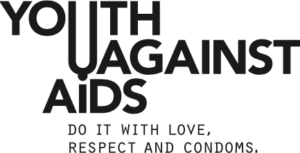

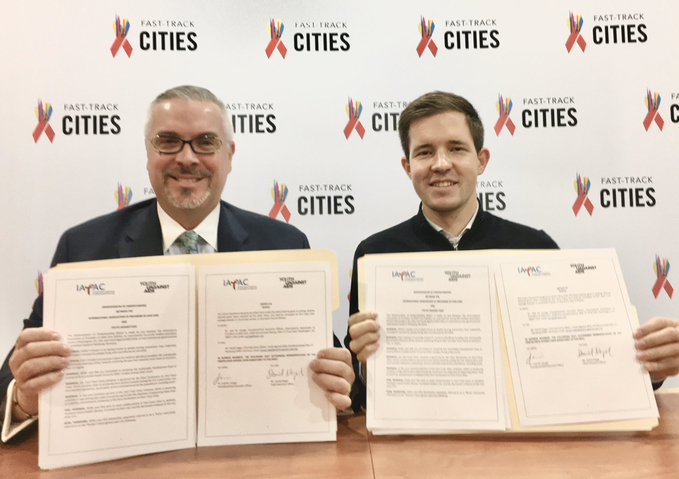
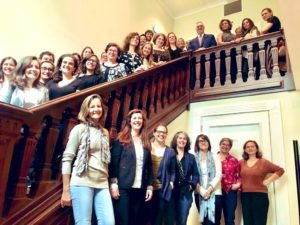 The
The 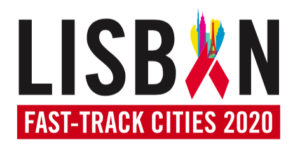
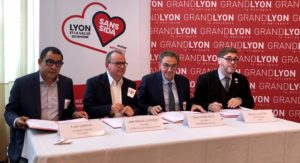 (LYON, France – October 10, 2019) The city of Lyon and M
(LYON, France – October 10, 2019) The city of Lyon and M
 Mayor Gilbert Annette of Saint-Denis de la Réunion signed the Paris Declaration and Mayotte County Council Vice President Issa Abdou signed the Paris Declaration, alongside IAPAC President Dr. José M. Zuniga. IAPAC and the City of Paris are original core partners of the Fast-Track Cities initiative, which has grown to reach over 300 communities around the world since it was launched in the French capital on World AIDS Day 2014.
Mayor Gilbert Annette of Saint-Denis de la Réunion signed the Paris Declaration and Mayotte County Council Vice President Issa Abdou signed the Paris Declaration, alongside IAPAC President Dr. José M. Zuniga. IAPAC and the City of Paris are original core partners of the Fast-Track Cities initiative, which has grown to reach over 300 communities around the world since it was launched in the French capital on World AIDS Day 2014.
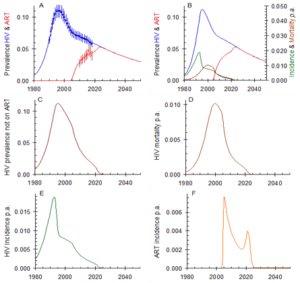
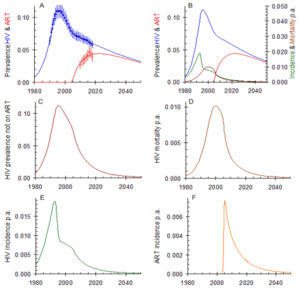
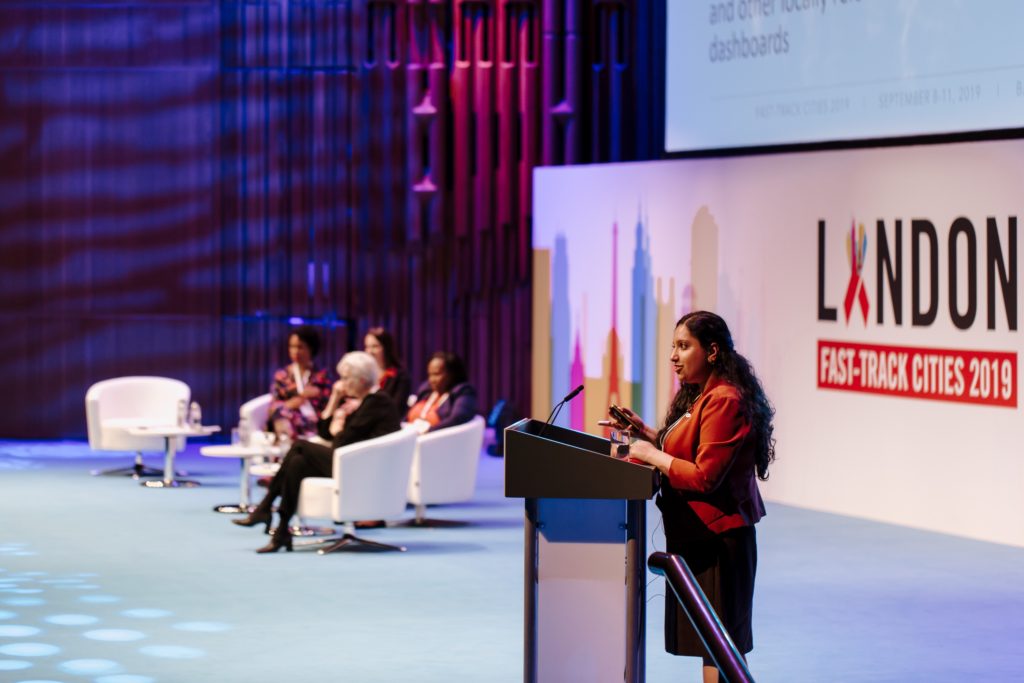


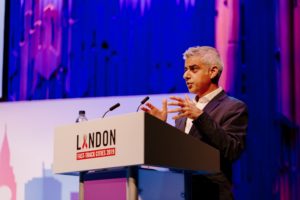
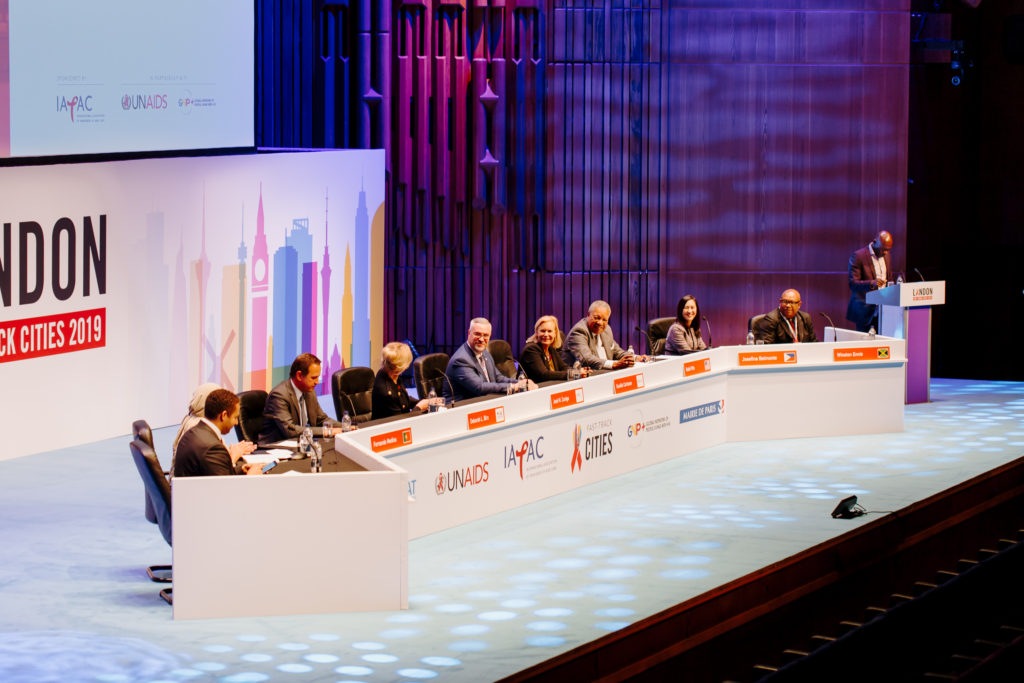

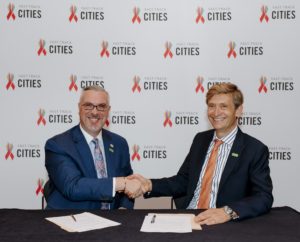
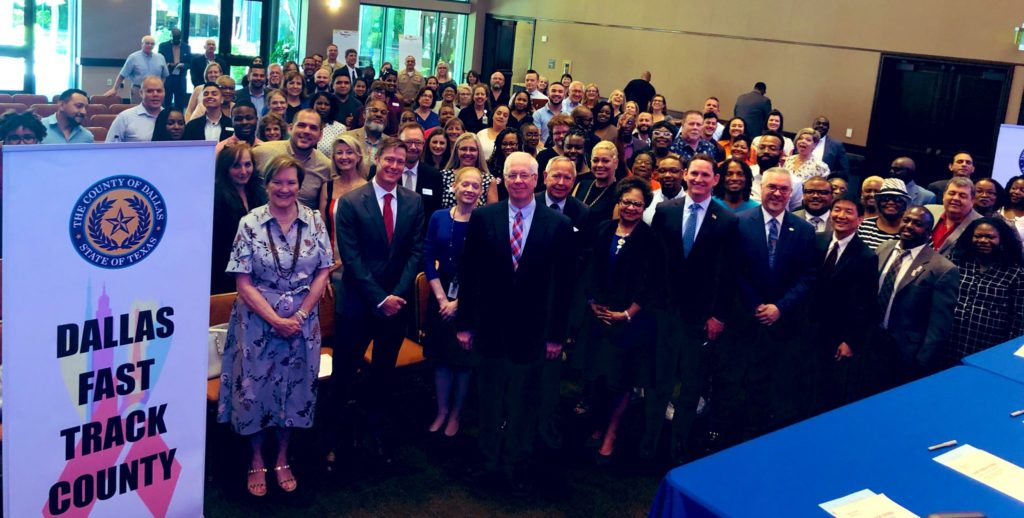
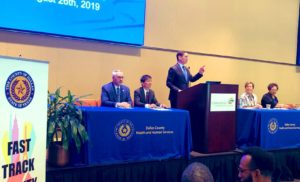
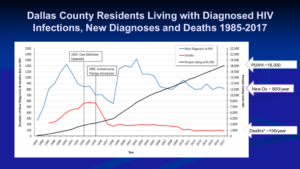
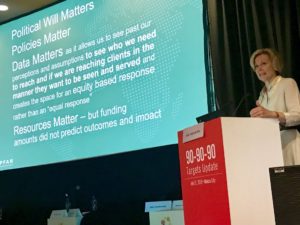
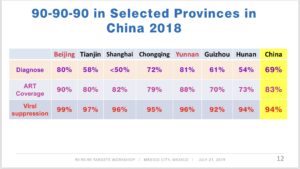
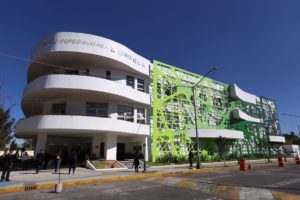
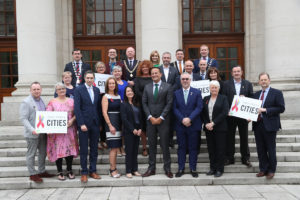
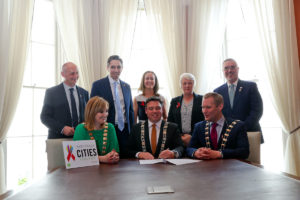 “IAPAC welcomes the Irish cities of Cork, Dublin, Galway, and Limerick to the Fast-Track Cities network, and we applaud the political commitment made by their Mayors, in partnership with affected communities, to work towards ending their local HIV epidemics,” said Dr. Zuniga. “We also applaud the Department of Health’s investment towards Fast-Track Ireland activities – an investment that is ‘wind in the sails’ for ambitious plans to scale-up HIV testing, linkage to preventative and therapeutic care, and eliminate the barrier that AIDS-related stigma continues to represent almost four decades into the global HIV epidemic.”
“IAPAC welcomes the Irish cities of Cork, Dublin, Galway, and Limerick to the Fast-Track Cities network, and we applaud the political commitment made by their Mayors, in partnership with affected communities, to work towards ending their local HIV epidemics,” said Dr. Zuniga. “We also applaud the Department of Health’s investment towards Fast-Track Ireland activities – an investment that is ‘wind in the sails’ for ambitious plans to scale-up HIV testing, linkage to preventative and therapeutic care, and eliminate the barrier that AIDS-related stigma continues to represent almost four decades into the global HIV epidemic.”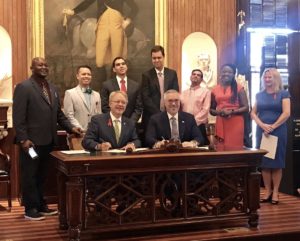 June 27, 2019 — Charleston, SC, Mayor John Tecklenburg signed the
June 27, 2019 — Charleston, SC, Mayor John Tecklenburg signed the 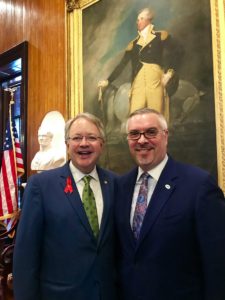


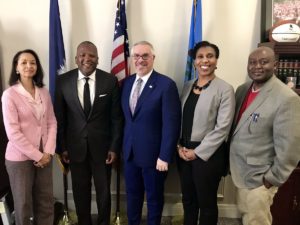 IAPAC President/CEO Dr. José M. Zuniga traveled to South Carolina last week to officially welcome the City of Columbia as the newest US member of the global Fast-Track Cities network. Dr. Zuniga also congratulated Mayor Steve Benjamin for his leadership in signing the Paris Declaration on Fast-Track Cities last month.
IAPAC President/CEO Dr. José M. Zuniga traveled to South Carolina last week to officially welcome the City of Columbia as the newest US member of the global Fast-Track Cities network. Dr. Zuniga also congratulated Mayor Steve Benjamin for his leadership in signing the Paris Declaration on Fast-Track Cities last month.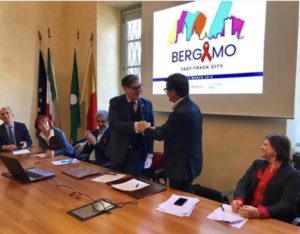
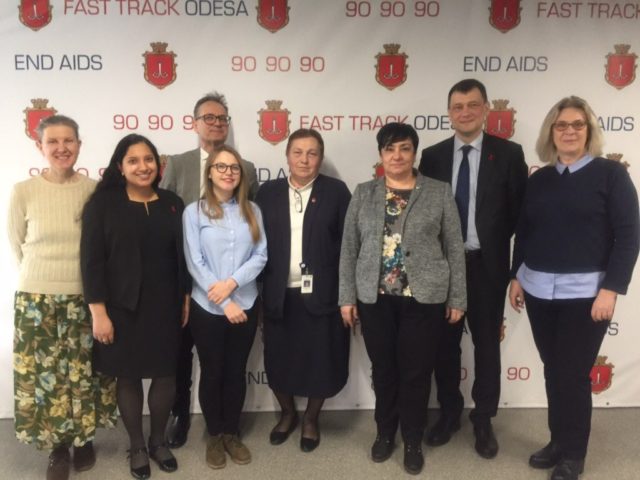
 Despite these difficulties, health officials in Odessa have made considerable progress by implementing new strategies, such as expanding access to and scaling up the availability of rapid HIV tests in all city health facilities, as well as making ART immediately available upon an HIV diagnosis. Municipal officials have also focused on issues such as preventing mother-to-newborn HIV transmission, and combatting social stigma that often deters people from seeking and utilizing HIV testing, prevention, care, and treatment services.
Despite these difficulties, health officials in Odessa have made considerable progress by implementing new strategies, such as expanding access to and scaling up the availability of rapid HIV tests in all city health facilities, as well as making ART immediately available upon an HIV diagnosis. Municipal officials have also focused on issues such as preventing mother-to-newborn HIV transmission, and combatting social stigma that often deters people from seeking and utilizing HIV testing, prevention, care, and treatment services.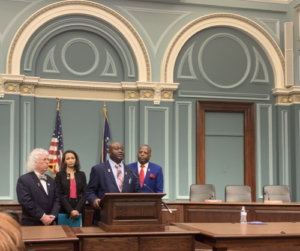 “The Paris Declaration highlights simple yet incredibly effective measures and practices that will allow us to achieve our goals as a city,” said Mayor Benjamin. “We look forward to playing a role in bettering the lives of our residents and improving the health outcomes of this community.”
“The Paris Declaration highlights simple yet incredibly effective measures and practices that will allow us to achieve our goals as a city,” said Mayor Benjamin. “We look forward to playing a role in bettering the lives of our residents and improving the health outcomes of this community.”







